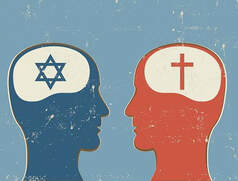
The first thing was his naming the Old Testament in the Christian Bible as just that. That might seem strange but there was a tendency a few years ago not to speak of the Old Testament but rather call it the First Testament or the Hebrew Bible. This was in deference to the Jewish community and the new appreciation that came after the Second Vatican Council that the Jews were still people in a covenantal relationship with God and their scriptures had their own integrity not to be dismissed as old or out of date. It became politically correct to avoid using the term Old Testament. For David old meant wisdom and veneration and for the Christian community the Old Testament sheds light on the New which doesn’t actually make sense without it. Nor is the Hebrew Bible identical with the Old Testament. For Jews the Bible, known as the TaNakh, has fewer books than the Christian Old Testament and Jewish and Christian versions of books such as Esther and Daniel differ as does the ordering of the books that are common to both. The two scriptures, while forming a shared common heritage and language, are different and have their own integrity which means that naming the Old Testament as the Hebrew Bible is inaccurate even if done for a good motive and out of a respect which might well be misguided in this instance.
This sense of the integrity of different scriptures comes out at scriptural reasoning sessions when Christians, Jews and Muslims share reflections on texts around a common theme. Often the basic story is similar but the language and details different. This would be obvious in a story such as that of Abraham’s sacrifice of his son – Isaac for Jews and Christians, Ishmael for Muslims. It would be easy to claim one as right and the other wrong rather than to look for the contexts of the stories and the theological reflections that gave rise to them and to their position in the different scriptures. Scriptures are religious documents with a theological message. They make sense within the context of a particular community but not necessarily within the context of another. They are to be read with their own logic and through their own spectacles. We should learn to read and understand the scriptures of other faiths in this way while being open to a wisdom from which we all might learn. There is of course another reading of scripture which belongs to academia and that too has its own integrity, to be understood within its own particular context.
Land was central to the weekend’s discussions and with it the idea of borders. Fr David suggested that the land created by God according to the book of Genesis was not bordered until human beings were expelled from Paradise and therefore a result of sin. A story that illustrates this well is that of Babel. Asked what Babel was about we responded – building a tower –no; trying to reach God –no, wasn’t trying to reach God a good thing! ; trying to be God – again no! The verse in the book of Genesis that refers to Babel is not about a tower but about a city:
“Come, let us build ourselves a city, with a tower that reaches to the heavens, so that we may make a name for ourselves; otherwise we will be scattered over the face of the whole earth.”
The story of Babel is about setting up borders, about a people who had been told to multiply and fill the earth confining themselves within their own constructs which, according to the Bible, led to confusion and dispersion. Today we live with borders, not just the borders that nations and tribes set up for themselves but borders imposed by others. This year we have been remembering the partition of India, the Balfour Declaration and the partitioning of Israel/Palestine. We are witnessing conflict and suffering because of the borders imposed on the Middle East by the Sykes-Picot agreement, to say nothing of the carving up of Africa by colonial powers. We witness so called developed nations closing their borders to refugees and immigrants. The bible story truly reflects the determination of human beings to live separately, to look upon those who come from another place, speak another language, live according to another culture or religion with suspicion, fearful of our own position or truth. Borders both physical and mental have caused so much suffering and yet they can give us a sense of identity and a place to belong. But can they not only be, or become, places where we meet and encounter one another in friendship and peace?


 RSS Feed
RSS Feed
